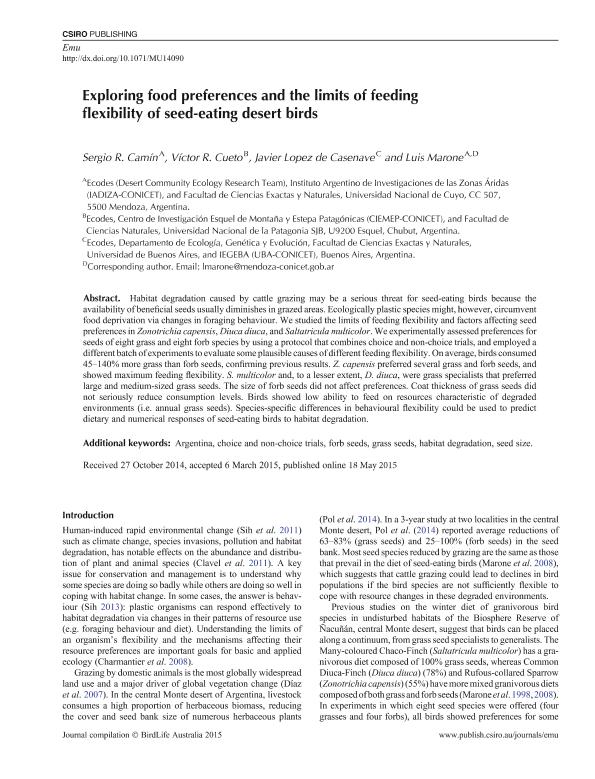Artículo
Exploring food preferences and the limits of feeding flexibility of seed-eating desert birds
Fecha de publicación:
10/2015
Editorial:
Taylor & Francis
Revista:
Emu
ISSN:
0158-4197
e-ISSN:
1448-5540
Idioma:
Inglés
Tipo de recurso:
Artículo publicado
Clasificación temática:
Resumen
Habitat degradation caused by cattle grazing may be a serious threat for seed-eating birds because the availability of beneficial seeds usually diminishes in grazed areas. Ecologically plastic species might, however, circumvent food deprivation via changes in foraging behaviour. We studied the limits of feeding flexibility and factors affecting seed preferences in Zonotrichia capensis, Diuca diuca, and Saltatricula multicolor. We experimentally assessed preferences for seeds of eight grass and eight forb species by using a protocol that combines choice and non-choice trials, and employed a different batch of experiments to evaluate some plausible causes of different feeding flexibility. On average, birds consumed 45–140% more grass than forb seeds, confirming previous results. Z. capensis preferred several grass and forb seeds, and showed maximum feeding flexibility. S. multicolor and, to a lesser extent, D. diuca, were grass specialists that preferred large and medium-sized grass seeds. The size of forb seeds did not affect preferences. Coat thickness of grass seeds did not seriously reduce consumption levels. Birds showed low ability to feed on resources characteristic of degraded environments (i.e. annual grass seeds). Species-specific differences in behavioural flexibility could be used to predict dietary and numerical responses of seed-eating birds to habitat degradation.
Palabras clave:
BEHAVIOUR
,
DIET
,
ECOLOGY
,
FEEDING
Archivos asociados
Licencia
Identificadores
Colecciones
Articulos(CIEMEP)
Articulos de CENTRO DE INVESTIGACION ESQUEL DE MONTAÑA Y ESTEPA PATAGONICA
Articulos de CENTRO DE INVESTIGACION ESQUEL DE MONTAÑA Y ESTEPA PATAGONICA
Articulos(IADIZA)
Articulos de INST. ARG DE INVEST. DE LAS ZONAS ARIDAS
Articulos de INST. ARG DE INVEST. DE LAS ZONAS ARIDAS
Articulos(IEGEBA)
Articulos de INSTITUTO DE ECOLOGIA, GENETICA Y EVOLUCION DE BS. AS
Articulos de INSTITUTO DE ECOLOGIA, GENETICA Y EVOLUCION DE BS. AS
Citación
Camín, Sergio Ramón; Cueto, Víctor; Lopez de Casenave, Javier Nestor; Marone, Luis; Exploring food preferences and the limits of feeding flexibility of seed-eating desert birds; Taylor & Francis; Emu; 115; 3; 10-2015; 261-269
Compartir
Altmétricas




